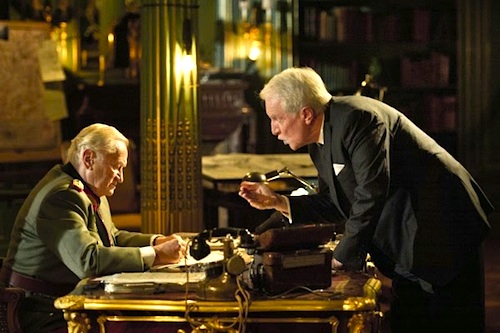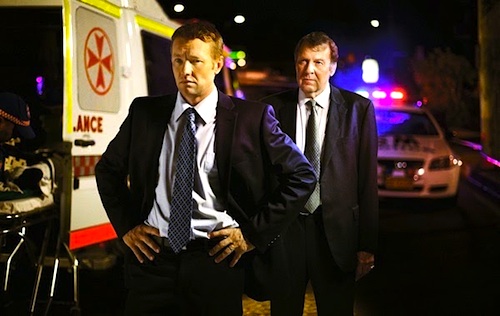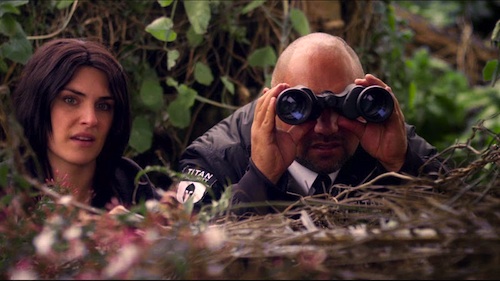By Joe Bendel. During WWII, Sweden’s official neutrality was not always pretty. Yet, despite the calculated concessions granted by their government, some Swedish diplomats became heroes for their courage and compassion. For his efforts rescuing tens of thousands of Jewish Hungarians, Raoul Wallenberg vanished to the world while in the custody of the Red Army. However, Raoul Nordling was awarded the Croix de Guerre for convincing Gen. Dietrich von Choltitz not to raze the city of Paris as he withdrew his forces. Some historians question that narrative, but Cyril Gely chose to print the legend in the stage play he and Volker Schlöndorff have now adapted for the screen. A very French drama plays out between the Swedish diplomat and the German officer in Schlöndorff’s Diplomacy, which opens this Wednesday at Film Forum.
Choltitz was one of the few old school Prussian officers not fatally embroiled in the Valkyrie Plot against Hitler. Although he often had profound misgivings, he always followed his orders, at least thus far. With the Allies rapidly approaching, Choltitiz is supposed to blow up key points of infrastructure, leaving the city in smoking wreckage. All the charges are set, but Swedish Consul Nordling has furtively slipped into Choltitz’s converted headquarters in a luxury hotel, using a secret passageway designed for Royal assignations. Before morning breaks, Nordling will try to convince and cajole Choltitz to disregard his orders, allowing Paris’s great cultural and architectural treasures to survive the war.
Essentially, Diplomacy is a one-set two-hander (with a few subordinate offers and a shanghaied engineer walking through from time to time), but the stakes could not be higher. It is a great chess match premise, but even though the narrative is completely stacked in Nordling’s favor it is Choltitz who emerges as the far more compelling dramatic figure.
As played by the ever reliable André Dussollier, Nordling is the suave diplomat arguing on the side of the angels. In contrast, Choltitz is a pricklier individual. Although he remains an inspirational figure for his rank-and-file, he is clearly troubled by the atrocities he duly participated in. Redemption always makes good movie fodder, but there are pressing reasons for Choltitz to acquiesce to madness dictated from above, which he will eventually reveal to Nordling.

Dussollier plays the diplomat with instantly credible intelligence and sophistication. Nonetheless, Niels Arestrup does all the heavy lifting and should earn the majority of critical laurels for his work as Choltitz. While he is a rough bull of a man, he conveys the multitude of internal conflicts roiling inside him.
The maybe-not-quite-as-leftwing-as-he-used-to-be-Merkel-supporting Schlöndorff opens up the film as best he can, but a certain amount of staginess is unavoidable—and perhaps even desirable for such a claustrophobic one-on-one. He maintains a good deal of tension, treating both the concerns of history and his main characters quite fairly. It is a good, solid film that makes one wonder why his thematically related Calm at Sea has yet to land an American distributor. Recommended for patrons of French cinema, Diplomacy opens this Wednesday (10/15) at New York’s Film Forum.
LFM GRADE: B
Posted on October 14th, 2014 at 7:46pm.


